

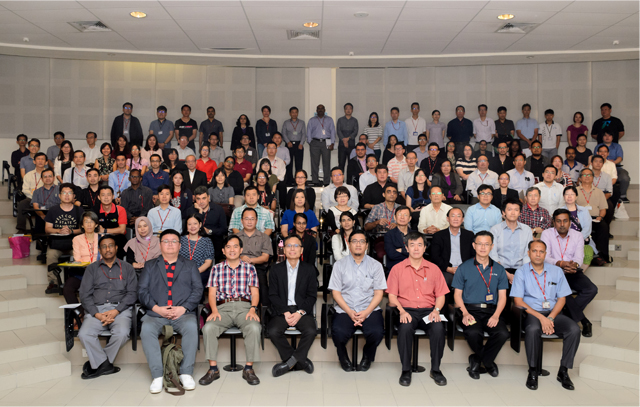
Prof Lee and Prof Faidz (seated front row, fourth and fifth from left respectively) with presenters and participants of the colloquium
Following the success of the past six R&D Colloquiums held since May 2014, the Institute of Postgraduate Studies and Research (IPSR) once again successfully organised its seventh R&D Colloquium at Kampar Campus on 22 July 2017.
Some 130 local and foreign researchers joined and came together during the university’s biannual colloquium on research and development. The UTAR R&D Colloquium (1.0) 2017 brought research participants together to present and share their research efforts in multiple fields of studies.
Themed ‘Global Challenges towards 2050’, the one-day conference continued to strengthen and nurture regular communication between researchers from the 28 research centres in UTAR through establishing research collaborations and reinforcing cross disciplinary research. It also served as a platform for a continuous update on research outcomes to the research centres, faculties, IPSR, and the Vice President’s office for R&D and Commercialisation.
A total of 13 presentations on various topics including developments in the education system, cyber security, data privacy, wastewater treatment, fourth industrial revolution, virtual reality learning, smartphone addiction and the impacts of education in the fourth industrial revolution, were delivered.
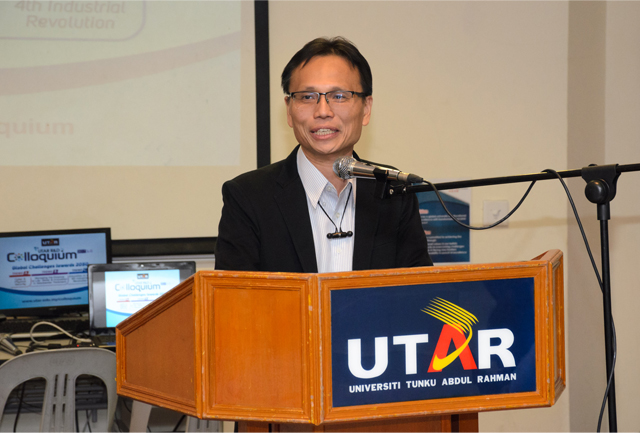
Prof Lee emphasising on the importance of socioeconomic
In his opening speech, UTAR Vice President for R&D and Commercialisation Prof Ir Dr Lee Sze Wei said, “I hope this colloquium will continue to enlighten its participants. I’m glad to be part of this colloquium for the past four years and it is indeed a great platform for all researchers to share their research methodologies and findings with other researchers and students. This colloquium also aims to help the participants to develop their analytical skills and engage in multi-disciplinary research.” Prof Lee also praised IPSR for their effort in organising the yearly colloquium with different themes and subthemes. Subthemes such as cyber and physical security, water innovation and wastewater treatment and education in the 4th industrial revolution will give deeper understandings to participants about the future global challenges and demands. He also emphasised, “In order to be up-to-date, the University must work closely with the industry for its research to have socioeconomic significance.”
The colloquium started with a sharing session by three researchers, namely Yeong Wai Mun, Dr Ngeow Yeok Meng and Aloysius Yapp on their past presentations delivered at the 2016 R&D Colloquium (2.0) which was held in Sungai Long Campus on 22 October 2016. It was then followed by the parallel sessions of this year’s colloquium. There were three sessions held concurrently with three subthemes, namely ‘Cyber and Physical Security’, ‘Managing the Essence of Life – Water and Innovation in Wastewater Treatment’ and ‘Education in the Fourth Industrial Revolution’, chaired by the Chairperson of Centre for Cyber Security Dr Yap Wun She; Chairperson of Centre for Disaster Risk Reduction Assoc Prof Ir Dr Huang Yuk Feng; and Chairperson of Centre for Learning and Teaching Er Pek Hoon respectively.
Among the highlights were Prof Ir Dr Chung Boon Kuan’s presentation on “Smart Readers and Systems”, Dr Goh Yong Kheng’s presentation on “Data Privacy and Mutual Information”, Dr Tey Lai Hock’s presentation on “Microalgae as the Potential Alternative Tool for Wastewater Treatment”, Prof Dr Akihiko Nakayama’s presentation on “Simulation of Transport of Floating Objects in Rivers”, Dr Pua Chang Hong’s presentation on “Fiber Optic Sensor for Water Pipeline Leakage Detection”, Dr Leong Kah Hon’s presentation on “Incorporation of PAC-PES Hybrid Membrane and TiO2 Photocatalyst in Wastewater Application”, Lee Eng Keong’s presentation on “Industry 4.0 Revolution: Lessons from MNC and SME”, R. Viji’s presentation on “Perceptions of Distance Learners towards Virtual Learning in the 21st Century: A Comparative Study between Malaysia and India”, Dr Lim Poh Im’s presentation on “Essence of Taiwanese Architecture Education: Lessons for UTAR” and Dr Myo Oo’s presentation on “Smartphone Addiction among Young People”.
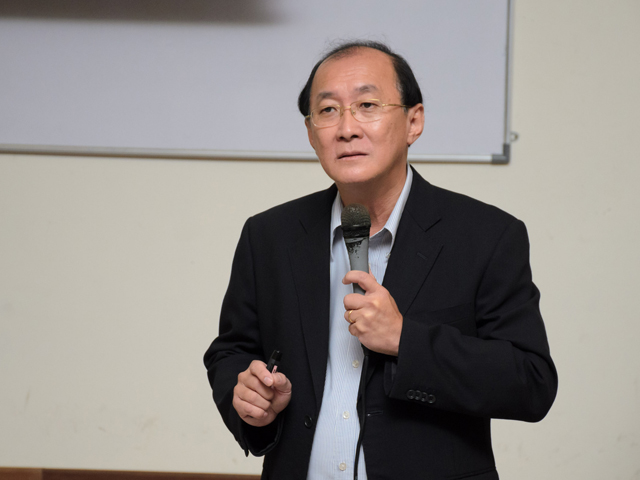
Phang delivering his talk
A talk titled “Education and its Impacts in the Fourth Industrial Revolution” was also delivered by Chairman of Friends of Kota Damansara Jeffrey Phang Fatt Kong, who elucidated the participants on the importance of technology transfer, human capital and the knowledge-based economy in the fourth industrial revolution.
Apart from that, the colloquium also saw a multi-disciplinary research proposal presentation presented by all the three session chairs on their respective subthemes.
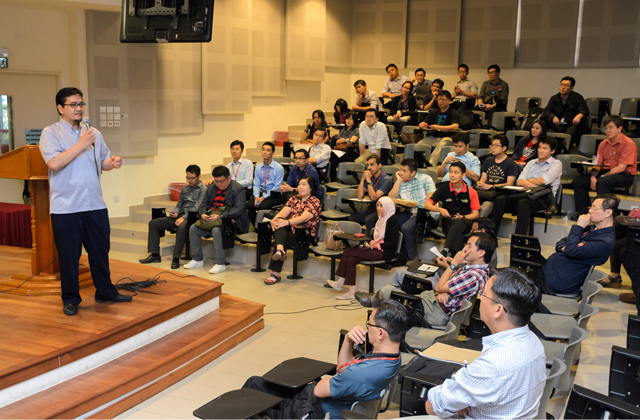
Prof Faidz highlighting the significance of human networks
IPSR Director Prof Dr Faidz bin Abd Rahman in his closing speech said, “I feel very proud to see the development of this R&D colloquium. I am very glad that the colloquium served its purpose and had been a great platform for all researchers to share their research knowledge as well as to build networks with others. The network session will enable the participants and presenters to exchange ideas, which will eventually improve the quality of the research. I hope UTAR researchers could work harder to conduct more meaningful researches which would bring transformative impacts to society and the nation.”
One of the participants of the colloquium, the Chairperson of the Centre for Accounting, Banking and Finance Dr Krishna Moorthy Manicka Nadar enthused, “The R&D colloquium is a platform for academics of diverse disciplines to share their expertise and to exchange resources for R&D projects. We need this type of colloquium that is vital to help the R&D flourish, which in turn benefits, especially the post-graduate students and academics of cross faculties of the university. I’m very much contented to be part of this colloquium again this year.”
He added, “As an academic, I believe the key to a successful researcher is human networking, therefore, one needs to form and enhance the networks in order for them to be up-to-date and equip themselves with relevant knowledge about research and development. For that, I would like to thank UTAR and the organising committee for organising events such as industry forums and colloquiums for staff and students to interact with the academics and industry players. It is indeed a great platform for all to improve in the field of research and development and to commercialise the research outputs.”
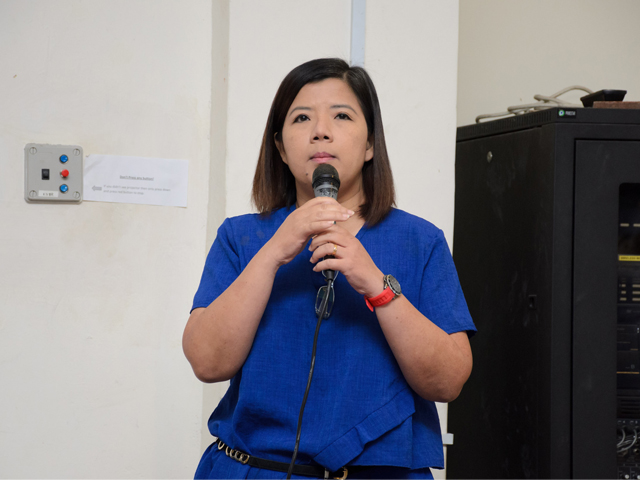
Dr Lim presenting her paper on the essence of architecture education
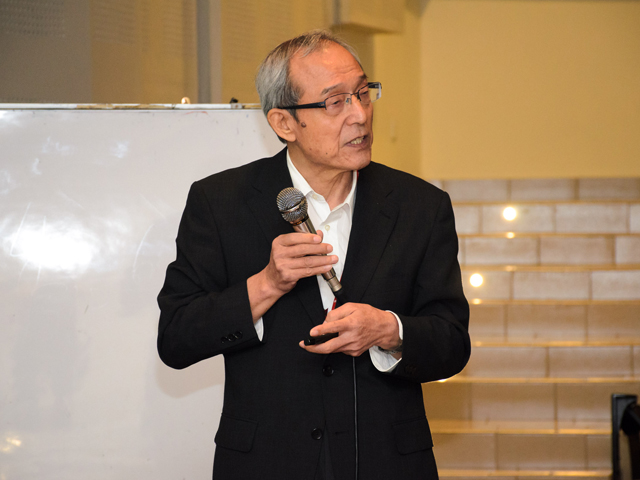
Prof Akihiko enlightening the participants about his research
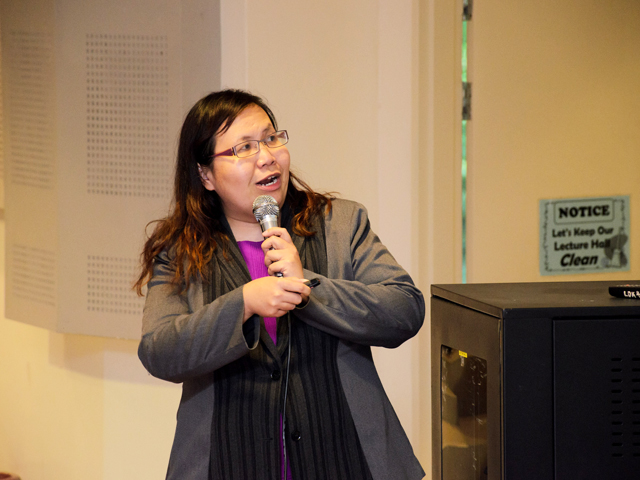
Er explaining the importance of virtual reality learning environment
In line with the Strengthening of Cross Disciplinary Research Centres under the UTAR 10-year Strategic Plan, IPSR organised UTAR’s maiden R&D Colloquium in 2014 at its Kampar Campus.
As a progressive university, UTAR constantly holds conferences and colloquia as platforms for researchers to share their research findings and network with others for more collaborative opportunities.
© 2019 UNIVERSITI TUNKU ABDUL RAHMAN DU012(A).
Wholly owned by UTAR Education Foundation Co. No. 578227-M LEGAL STATEMENT TERM OF USAGE PRIVACY NOTICE